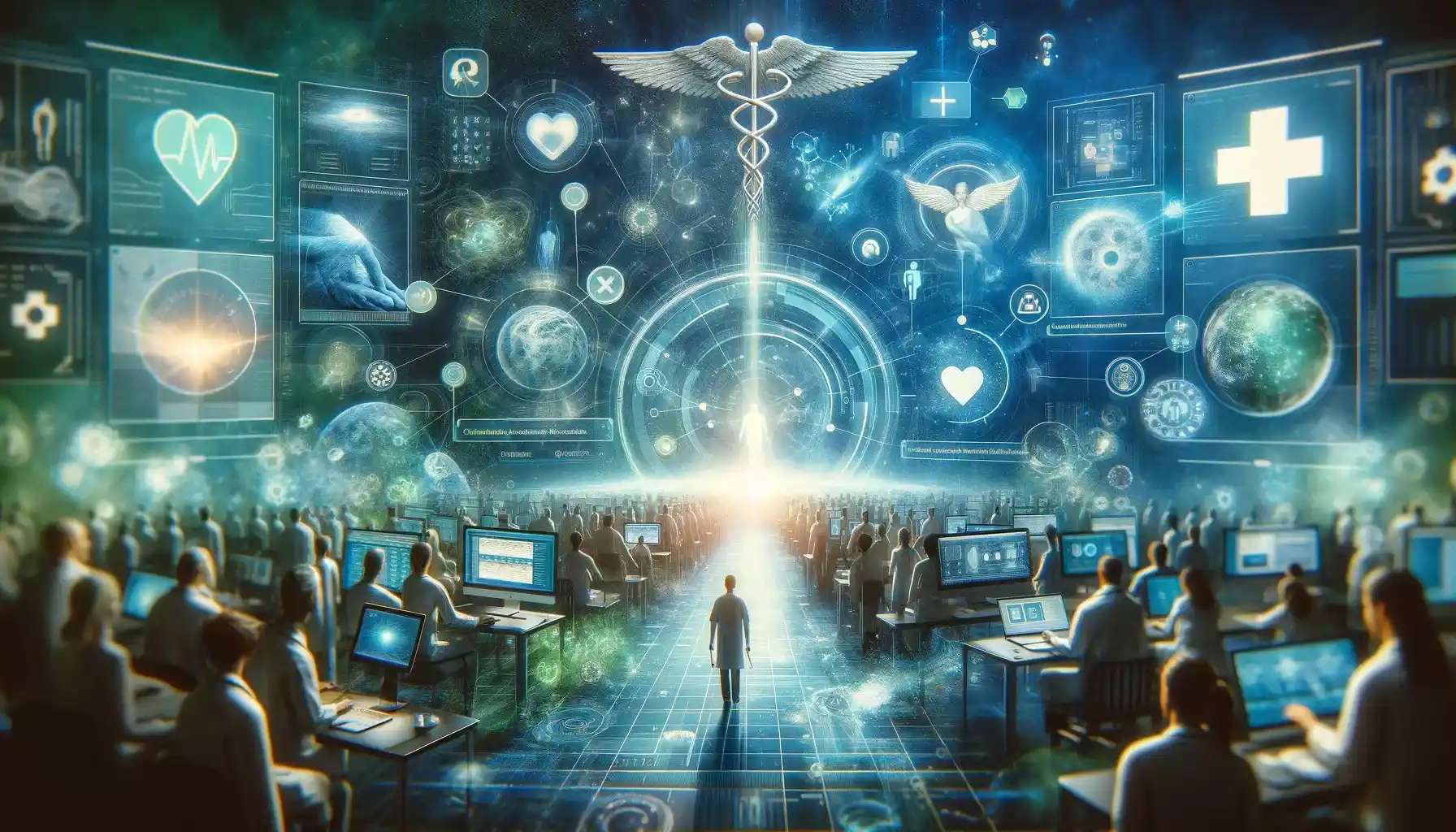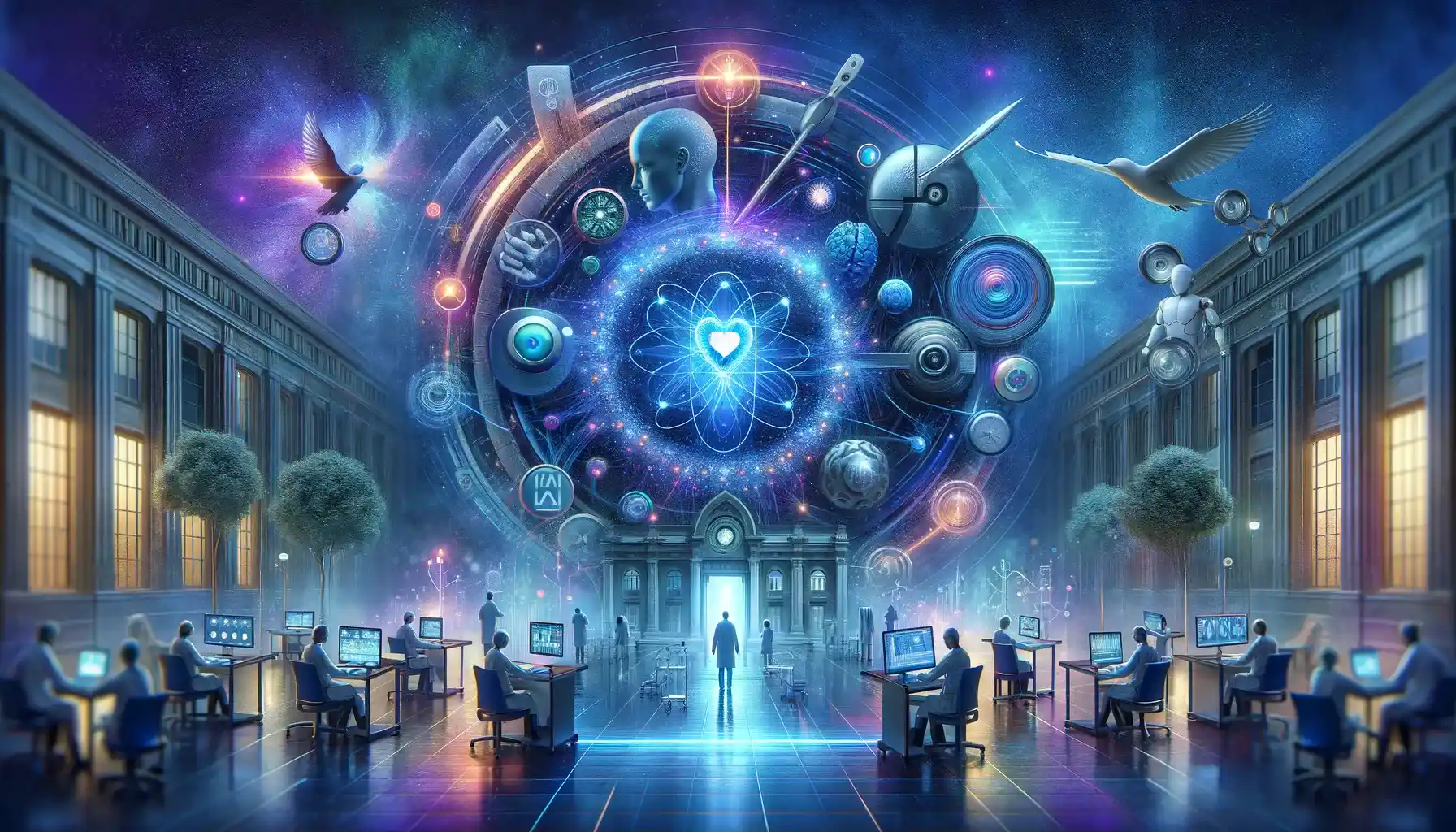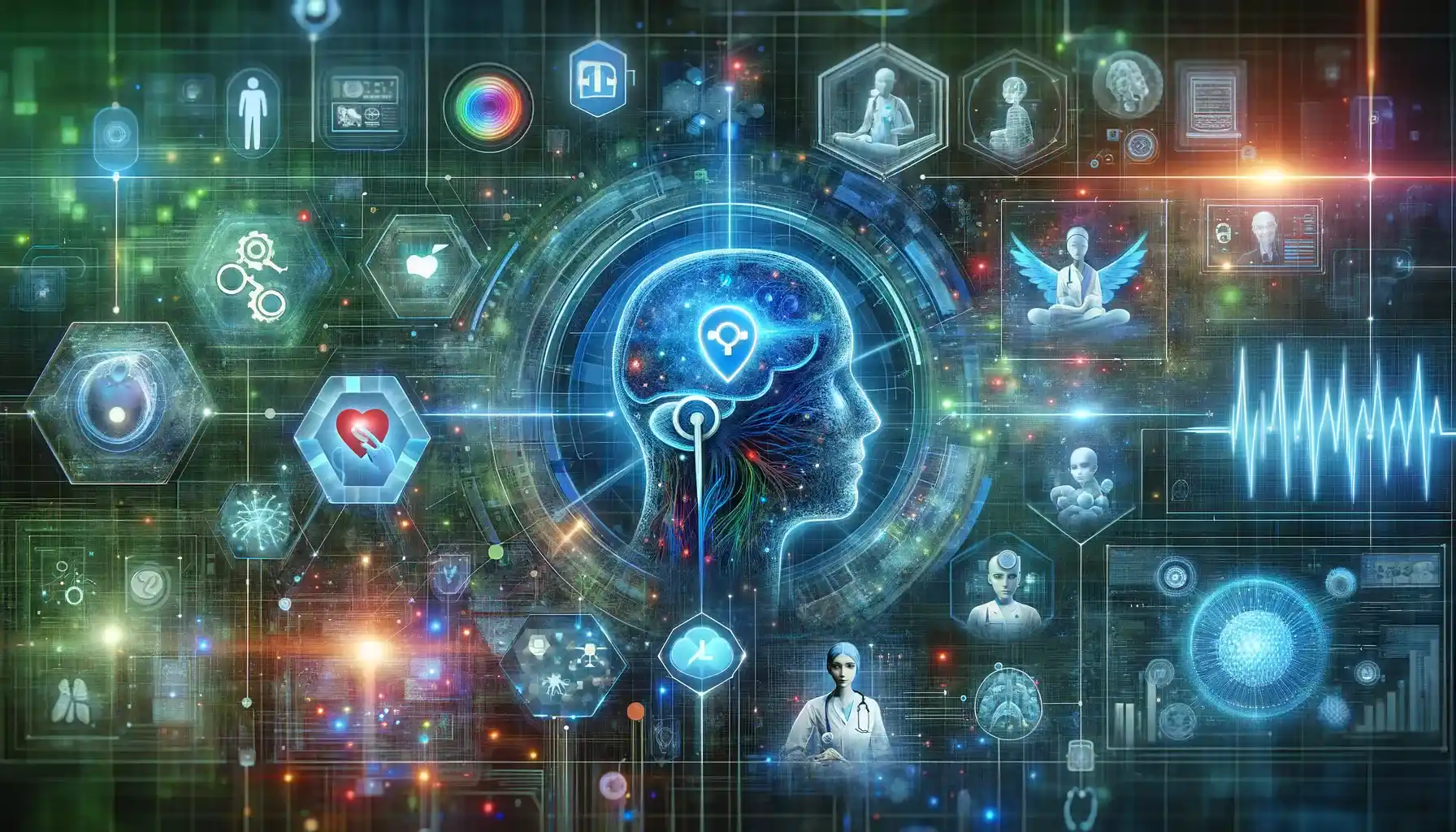Table of Contents
In the fast-paced landscape of technological advancements, machine learning (ML) and artificial intelligence (AI) stand out as two of the most impactful innovations. While these technologies constantly evolve and find new applications across various sectors, their integration into healthcare is not recent.
Dating back to the 1970s, the Potential of AI and ML in the healthcare industry has been exploring new applications. Over the years, AI-powered solutions have undergone significant refinement and adaptation, reshaping the healthcare landscape by addressing key challenges and opportunities.
Today, AI and ML have emerged as indispensable tools in healthcare, offering myriad transformative solutions to enhance patient wellness and outcomes. These technologies, from predictive analytics to personalized treatment plans, empower healthcare providers to deliver more effective and efficient care.
By analyzing vast amounts of data, AI and ML algorithms can identify patterns, predict potential health issues, and optimize treatment strategies. Moreover, they facilitate remote patient monitoring, streamline administrative tasks, and expedite drug discovery processes.

The integration of AI and ML in healthcare not only drives improvements in patient care but also revolutionizes healthcare delivery models. By harnessing the power of data-driven insights and intelligent automation, healthcare organizations can achieve higher levels of precision, productivity, and patient satisfaction.
As AI and ML continue to advance, the possibilities for innovation and enhancement in healthcare are limitless, promising a future where technology plays a central role in promoting wellness and improving lives.
Applications of AI and ML in Healthcare
1. Robotic Surgery
In the realm of surgery, precision is paramount and potentially lifesaving. Surgeons must maintain focus on each incision and step. AI and ML in healthcare have facilitated the development of collaborative robots for surgical assistance. These robots, adept at controlled movements, offer tireless precision, particularly beneficial for repetitive tasks.
Applications: At the renowned Mayo Clinic in the US, AI and ML application in healthcare takes the form of robotic surgery, particularly with the da Vinci Surgical System. This cutting-edge technology enhances surgical precision and accuracy, facilitating intricate procedures in urology, gynecology, and colorectal surgery for improved patient outcomes.
2. Precision Medicine
Precision medicine tailors treatment plans based on individual genetic or molecular profiles for maximum therapeutic benefit. AI and ML in healthcare analyze complex data to identify patterns, aiding in personalized treatment decisions. They provide clinical decision support, enhancing the effectiveness of individualized patient care.
Application: Microsoft’s Project InnerEye employs computer vision and machine learning within healthcare applications. It assists in radiotherapy and surgery planning by distinguishing malignancies from healthy anatomy in 3D radiological images. This AI-driven approach aims to tailor medicine to individual patient requirements, promising more personalized and effective treatments.
3. Electronic Health Records (EHR)
Electronic Health Records (EHR) are digital repositories containing comprehensive patient data, managed and updated by healthcare professionals. These records encompass administrative and clinical information crucial for patient care. AI and ML in Healthcare play a pivotal role in leveraging EHR data to derive valuable insights, enhancing patient diagnosis and treatment.
Application: The Massachusetts General Hospital Clinical Data Science Center, in collaboration with NVIDIA, pioneers AI and ML applications in healthcare, targeting disease detection, diagnosis, treatment, and management. Initially focused on radiology and pathology, the center aims to extend these technologies to electronic health records (EHR) and genomics for comprehensive healthcare solutions.
4. Genome Sequencing
Genome sequencing, a cornerstone of genomics, investigates the structure, function, and evolution of organisms’ genetic material. AI and ML in healthcare play pivotal roles in this domain, expediting scientific breakthroughs. They aid in genome assembly, variant detection, and drug development, revolutionizing genomic medicine with their analytical prowess.
Application: At the Hospital for Sick Children in Toronto, Canada, an innovative application of AI and ML in healthcare is transforming genetic diagnosis. MendelScan, an AI-based tool, utilizes ML algorithms to analyze genetic data, pinpointing potential disease-causing mutations. This method assesses the likelihood of specific mutations contributing to a patient’s symptoms by cross-referencing their genomic data with a comprehensive database of known variants.
5. ML-based Behavioral Modification
The integration of AI and ML in healthcare has led to the emergence of companies focusing on various areas such as patient treatment and cancer prevention. One emerging application is ML-based behavioral modification, a psychotherapy strategy aimed at curbing inappropriate psychological behavior. ML algorithms analyze past behaviors to suggest necessary modifications, like predicting smoking likelihood based on demographic and behavioral data.

Application: SkinVision, a smartphone application utilizing AI and ML in healthcare, aids users in early skin cancer detection. Through algorithms, it analyzes photos of lesions, providing risk estimates. ML algorithms assess lesion risk by referencing a database, enabling behavioral modification for proactive healthcare management.
6. Medical Imaging Diagnosis
In the realm of medical imaging diagnosis, cutting-edge technology such as CT scans and MRIs enables radiologists to obtain clearer insights into patients’ conditions. However, the sheer volume of images can overwhelm pathologists, leading to potential inaccuracies. AI and ML in healthcare offer solutions by automating tasks and aiding in the detection of complex issues. For example, AI algorithms can identify cardiovascular abnormalities and streamline analysis tasks like evaluating aortic valves and pulmonary arteries.
Application: The University of California, San Francisco (UCSF) Medical Center leverages AI and ML in healthcare through “Clinical,” an innovative application for intelligent imaging. This AI-powered system utilizes deep learning algorithms to analyze medical images, offering diagnostic insights and recommendations to radiologists, thereby enhancing diagnostic accuracy and patient care.
7. Oncology Research
In the field of oncology research, the impact of Machine Learning and AI in healthcare is profound. These technologies contribute significantly to improving clinical practice, enhancing cancer research, and optimizing treatment outcomes. By better understanding tumor features and predicting treatment responses, AI empowers oncologists to provide more effective care.
Additionally, Natural Language Processing (NLP) streamlines the process of identifying relevant articles and research papers, saving time and effort in finding treatment options for cancer patients.
Application: Pfizer, a global pharmaceutical leader, partners with IBM Watson AI in healthcare. Their collaboration aims to expedite drug discovery and enhance immuno-oncology research, ultimately benefiting cancer patients. AI and ML applications empower innovative approaches, promising advancements in oncology treatment and patient outcomes.
8. Improved Radiology
In the realm of healthcare, particularly in radiology, the demand for AI and ML solutions is soaring. Medical imaging analysis often presents numerous discrete variables, such as tumors or lesions, making diagnosis complex. However, AI algorithms, learning from diverse samples, simplify the identification of these factors, addressing the challenge of accurately simulating their locations.
Application: In healthcare institutions such as Mount Sinai Health System in NYC, AI-driven radiology applications are pivotal. AI serves as a supplementary tool, offering a “second opinion” to radiologists in COVID-19 detection through CT scans. These systems, pioneered by health-tech startups like Synapsica, exemplify advanced AI-enabled diagnostic radiology technologies.
9. Clinical Trial Optimization
Clinical trial optimization through AI and ML in healthcare offers transformative solutions. These technologies streamline participant selection by analyzing diverse data points, optimizing sample sizes, and ensuring real-time monitoring. Leveraging electronic records, they minimize errors, reduce costs, and accelerate the pace of medical research, revolutionizing clinical trials.
Application: Medidata, a comprehensive life science platform, integrates AI and ML in healthcare, merging data with AI-driven insights to enhance clinical trials and develop patient-centered therapies. Leveraging Rave EDC for electronic data capture, it efficiently manages extensive datasets, fostering innovation and accelerating medical advancements in research and treatment.
10. Predictive Analytics
AI and ML in Healthcare revolutionize predictive analytics by analyzing vast medical datasets, identifying patterns, and forecasting future events. These technologies leverage complex data to enhance accuracy and efficiency, enabling healthcare professionals to make informed decisions and intervene proactively for improved patient outcomes.
Application: In healthcare, Kaiser Permanente utilizes AI and ML applications such as predictive analytics to identify individuals prone to chronic conditions like diabetes and heart disease. Leveraging vast patient data, their platform KP HealthConnect offers personalized interventions, empowering patients to proactively manage their health and mitigate risks.

Transforming Healthcare: The AI & ML Conclusion
Applying AI and ML in healthcare holds vast potential, promising accelerated development of life-saving cures and treatments. These technologies expedite processes, leading to enhanced patient outcomes and reduced costs. Rapid and reliable evaluation of extensive patient data enables better diagnoses and individualized care.
Moreover, ML and AI accelerate the discovery of novel treatments by facilitating more successful clinical trials and medication discovery. This integration signifies a paradigm shift, revolutionizing patient care and wellness approaches. Predictive analytics, precision medicine, and virtual health assistants are just a few examples of the myriad innovative solutions offered. Harnessing the power of AI and ML ensures a future of personalized, effective, and compassionate healthcare worldwide.
It’s a boon to healthcare innovation, transforming patient care and saving lives. The possibilities are endless, promising a brighter, healthier future for individuals globally. AI and ML are the driving forces behind this transformative journey toward better healthcare outcomes.